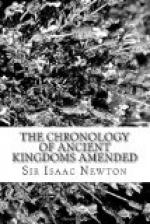The lower part of Egypt being yearly overflowed by the Nile, was scarce inhabited before the invention of corn, which made it useful: and the King, who by this invention first peopled it and Reigned over it, perhaps the King of the city Mesir where Memphis was afterwards built, seems to have been worshipped by his subjects after death, in the ox or calf, for this benefaction: for this city stood in the most convenient place to people the lower Egypt, and from its being composed of two parts seated on each side of the river Nile, might give the name of Mizraim to its founder and people; unless you had rather refer the word to the double people, those above the Delta, and those within it: and this I take to be the state of the lower Egypt, ’till the Shepherds or Phoenicians who fled from Joshuah conquered it, and being afterwards conquered by the Ethiopians, fled into Afric and other places: for there was a tradition that some of them fled into Afric; and St. Austin [249] confirms this, by telling us that the common people of Afric being asked who they were, replied Chanani, that is, Canaanites. Interrogati rustici nostri, saith he, quid sint, Punice respondentes Chanani, corrupta scilicet voce sicut in talibus solet, quid aliud respondent quam Chanaanaei? Procopius also [250] tells us of two pillars in the west of Afric, with inscriptions signifying that the people were Canaanites who fled from Joshuah: and Eusebius [251] tells us, that these Canaanites flying from the sons of Israel, built Tripolis in Afric; and the Jerusalem Gemara, [252] that the Gergesites fled from Joshua, going into Afric: and Procopius relates their flight in this manner. [Greek: Epei de hemas ho tes historias logos entauth’ egagen. epanankes eipein anothen, hothen te ta Maurousion ethne es Libyen elthe, kai hopos oikesanto. Epeide Hebraioi ex Aigyptou anechoresan, kai anchi ton Palaistines horion egenonto; Moses men sophos aner, hos autos tes hodou hegesato, thneskei. diadechetai de ten hegemonian Iesous ho tou Naue pais; hos es te ten Palaistinen ton leon touton eisegage; kai areten en toi polemoi kreisso he kata anthropou physin epideixamenos, ten choran esche; kai ta ethne hapanta katastrepsamenos, tas poleis eupetos parestesato, aniketos te pantapasin edoxen einai. tote de he epithalassia chora, ek Sidonos mechri ton Aigyptou horion, Phoinike xympasa onomazeto. basileus de eis to palaion ephestekei; hosper hapasin homologetai, hoi Phoinikon ta archaiotata anegrapsanto. entauth’ okento ethne polyanthropotata, Gergesaioi te kai Iebousaioi, kai alla atta onomata echonta, hois de auta he ton Hebraion historia kalei. houtos ho laos epei amachon ti chrema ton epelyten strategon eidon; ex ethon ton patrion exanastantes, ep’ Aigypton homorou ouses echoresan. entha choron oudena




